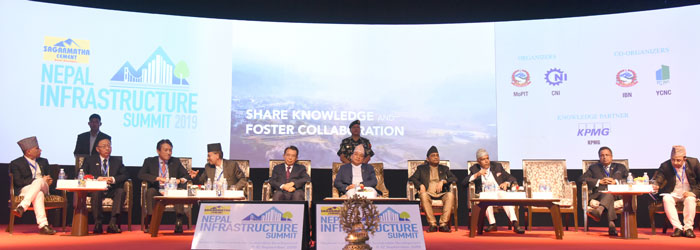
Vice-President Nand Bahadur Pun said that development of the first condition is the fulfillment of the national aspiration of a prosperous Nepal.
Addressing a two-day Third Nepal Infrastructure Summit 2019 jointly organized by the Government of Nepal and the Federation of Nepalese Industries on Wednesday, Vice President Pun recalled the past seven decades of political change. He said the country was now ready to fulfill its original agenda of economic prosperity.
He made it clear that the country wants prosperity through the rapid development of agriculture, tourism, and hydropower industry infrastructure. "The world's exemplary constitution has secured federalism, republic and inclusive governance in the country," he said, adding, "Now sustainable development, economic and social transformation is our necessity. "
Talking that the economy of the country is moving in a progressive direction, Vice President Pun said that prosperity through the private sector and foreign investment should still accelerate. "Although we have achieved economic growth of 7.1 percent, we have achieved the goal of achieving double-digit growth in the 15th Plan," he added, adding that "to achieve the goal of sustainable development, the contribution of the private sector and foreign investment will contribute to the dream of prosperity. "
He said that suitable opportunities have been created in Nepal for the private sector and foreign investment and urged to utilize them. "Nepal is a fertile investment and the 'Virgin Land'. The private sector should make the most of the investment-friendly environment by playing a role in bringing foreign investment, ”he said.
Prime Minister KP Oli, who was unable to attend the inauguration of the conference, urged the private sector and foreign investors to participate in Nepal's prosperity campaign without any hesitation. "The government's investment is not enough to meet the goal of prosperity; the private sector must play its driver's role and invest in the infrastructure sector," said Prime Minister Oli's press adviser. The message read by Kundan Aryal states, “The government is always ready to work with the private sector. "
Addressing the program, former Prime Minister of Korea Dr. Hong Sung Soi praised the economic growth achieved by Nepal in the face of earthquakes, natural disasters. He suggested that rural areas should be developed through connectivity such as road network, electricity, communication.
Minister for Physical Infrastructure and Transport Raghuvir Mahaseth informed that they have proceeded with short-term, medium-term and long-term plans for infrastructure development like water resources, energy, roads, railways, urban development. He said the target is to build 15,000 km of highway in the next five years and three thousand km of railway in ten years.
Speaking about the progress made by Bihar State in the last year, Minister of State for Power Alternative Energy of India Rajkumar Singh said that if the state creates a favorable environment, there will be no shortage of cash and investors will be automatically attracted to profit. Suggesting Nepali policymakers and the private sector, he said, "Make sure the investors are profitable and make policies and other arrangements to ensure that they do not face any problems while working. "
Vice-President of the World Bank, Jing Dong Hua, suggested attracting foreign capital through the brandmark, saying Nepal was not even 'Idea Locked' even if it was surrounded by land.
Former Chairman of the Federation of Nepalese Industries, Vinod Chaudhary, urged the governments of both countries to focus on completing projects such as Pancheshwar, Chisapani Karnali, saying the Nepal-India Petroleum Pipeline expansion was commendable ahead of time.
Another former president of the United Nations, Haribhakta Sharma, said that after 50 years, a strong government was created in Nepal and made good use of it. "Now we have to persevere to make it a mountainous region,".





